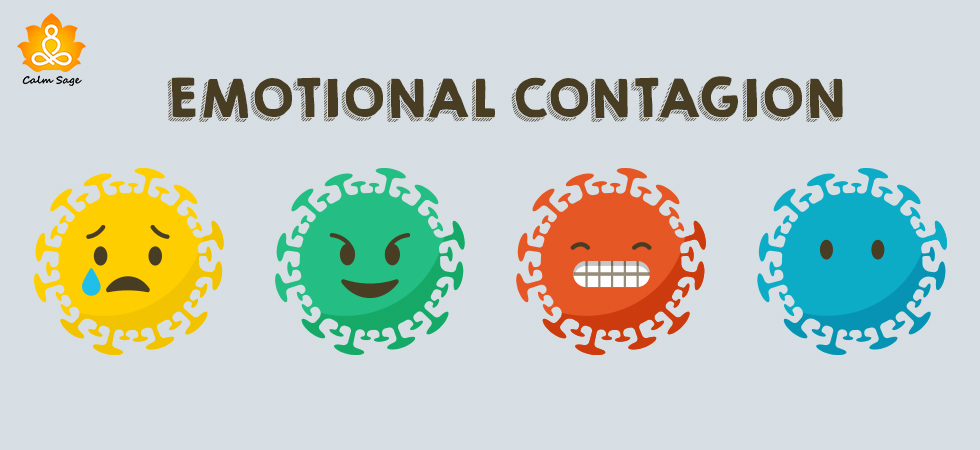Everything You Need To Know About Emotions Contagious

Do you cry watching an emotionally tragic movie? If yes, that’s a perfect example of emotional contagion. I will tell you how…while watching a tragic movie you relate with the emotions and even if you haven’t been in a tragedy like that, you end up crying.
Just like you can catch a cold if your friend has it, you can catch emotions too. It will give you another example of emotional contagion, do you feel emotional while listening to an emotional song or when you are already emotional and a sad song plays, your emotions intensify?
If yes, then you have caught a crazy case of emotions! Let’s understand how and why it happens…
What Is Emotional Contagion?

Emotional contagion is a phenomenon where emotions are unconsciously copied. When one person’s emotions are heavily associated with your memories and thoughts and you begin to feel the same way and emit similar emotions. This contagious property of emotions is known as emotional contagion.
Simply put, emotional contagion is an automatic adoption of another person’s emotions which sometimes comes from being empathetic towards others. The question now is how does that happen? What’s the theory behind it?
Also read: Mastering Your Emotions: 11 Steps On How To Control Your Emotions
Things to remember:
- Emotional contagion is a process of unconsciously mirroring the emotions
of a friend, song, movie, etc. - Emotional contagion theory states that emotions can be contagious
because of the neuron mirror system. - Emotional contagion is not transference, it is association & mirroring.
- Emotional contagion triggers are facial expression, posture, and intonation
in speech. - Emotional contagion is not the same for everyone, the intensity may vary.
- Emotional contagion theory is being used by advertising companies for
eons now, to associate positive emotions with the brand.
What Is The Theory Of Emotional Contagion?
According to the emotional contagion theory, when you are with an emotional person, you are more likely to attract those feelings and emotions. You then begin to feel exactly what the other person is feeling.
Let’s talk about it scientifically. Now, there is a thing called the neuron mirror system. When a person is emotional, certain neurons come into action with potential and fire and that is how you feel those emotions.
What the neuron mirror system does is, when you come in contact with such emotions, it quickly brings similar neurons into action and they begin to fire. Hence, you begin to have the same emotions as the other person.
And that’s the theory of emotional contagion!
Also read: Positive Emotions In Our Life Beyond Happiness
What Can Trigger Emotional Contagion?

Emotions can be contagious and it is spread through various ways but most importantly it is spread through body language and facial expressions. Let’s look at all that can trigger emotional contagion…
- Facial expression: the expression on the face says a lot about a person’s feeling, mood and emotions. It is the fastest way to signal your mind about someone’s emotions. And once your mind reads it, it takes no time in replicating the emotion.
- Body language: Body language is another way you can judge someone’s feelings. This mostly happens with mothers, as soon as they see their children fatigued and tense they quickly begin to feel stressed.
- Association: if you relate with someone’s condition and those memories are associated with emotions which are similar to the other person then the mirror is quite possible. This is also possible if you have an association with the person.
- Empathy: if you are an empathetic person, if you are put in a situation where you see a lot of misery,you are most likely to feel miserable too. Like we all know misery loves company.
Also read: What is Emotional Avoidance? Here’s How to Use Negative Emotions in Your Favor
Here Are Some Examples From Our Daily Life Of Emotional Contagion

- We feel and express similar kinds of emotions to the music we are listening to or vice-versa. The trigger here is the mood.
- If the boss isn’t happy, the entire office comes under stress. The trigger here is association.
- A tragic movie makes you cry. In a movie all the triggers of emotional contagion are present. It depends on you which you relate with the most. Association is said to be the most active.
- You see a mother struggling with a sick baby, you immediately feel the pain. Trigger here is body language and sometimes facial expression & association.
- Your dog/cat/pet jumps joyfully when you return from the office and you quickly become joyful too. Trigger here is body language.
All these are examples of the contagious property of emotions. I think it’s quite evident that emotions can be contagious and how. Therefore, let’s take advantage of emotional contagion and spread happiness and joy.
That’s all about emotional contagion. I hope you enjoyed reading the blog. Do comment and tell me did you find the emotional contagion theory fascinating? Let’s all keep a check on the trigger of emotional contagion and not mirror the emotion when you know it’s going to make you miserable.
Thanks for reading.
Take care and stay safe.




















